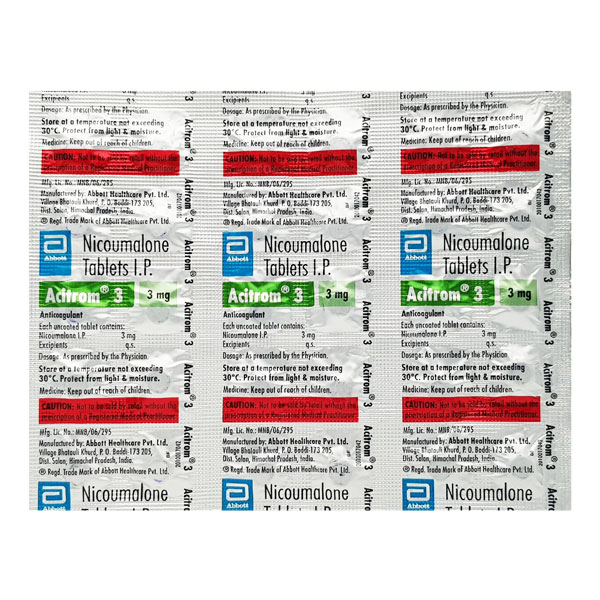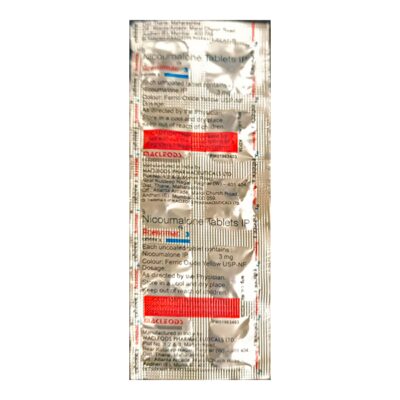🩸⚖️💊 Acenocoumarol 3mg Tablet: Precision Anticoagulation for Clot Prevention
Acenocoumarol 3mg is an oral anticoagulant (blood thinner) used to prevent and treat blood clots in various medical conditions. It belongs to the vitamin K antagonist (VKA) class of drugs and is structurally related to warfarin, but with a shorter half-life and quicker onset of action. Acenocoumarol is commonly prescribed for patients with atrial fibrillation, deep vein thrombosis (DVT), pulmonary embolism (PE), and for those with mechanical heart valves.
The drug works by inhibiting the synthesis of vitamin K–dependent clotting factors, thereby reducing the blood’s ability to form clots.
🔬 Mechanism of Action
Acenocoumarol inhibits the enzyme vitamin K epoxide reductase, which is essential for activating clotting factors II, VII, IX, and X in the liver. These factors require vitamin K to function, and by disrupting their synthesis, Acenocoumarol:
-
Slows blood clot formation
-
Reduces the risk of thromboembolism (clot traveling to vital organs like lungs or brain)
-
Helps maintain blood flow in high-risk patients
📌 Indications and Uses
Acenocoumarol 3mg is indicated for:
-
Prevention and treatment of venous thromboembolism (VTE) – including DVT and PE
-
Prevention of stroke and systemic embolism in atrial fibrillation
-
Thromboembolism prevention in patients with prosthetic heart valves
-
Secondary prevention after myocardial infarction in selected cases
💊 Dosage and Administration
-
Initial dose: typically 2–4 mg daily, then adjusted based on INR (International Normalized Ratio)
-
Maintenance dose: individualized; can range from 1 to 8 mg/day
-
INR monitoring is essential, usually maintained between 2.0–3.5 depending on the condition
-
Taken orally, once daily, preferably at the same time each day
⚠️ Precautions and Warnings
-
Regular INR testing is mandatory to avoid bleeding or clotting risks
-
Use with caution in patients with:
-
Liver or kidney impairment
-
High bleeding risk (e.g., peptic ulcer, recent surgery)
-
Uncontrolled hypertension
-
-
Avoid in:
-
Pregnancy (especially first trimester) – teratogenic effects
-
Patients with bleeding disorders or active bleeding
-
Patients must be educated on drug interactions, dietary precautions, and signs of bleeding.
🤒 Side Effects
Common:
-
Easy bruising
-
Nosebleeds
-
Bleeding gums
-
Prolonged bleeding from cuts
Serious:
-
Internal bleeding (gastrointestinal, cerebral)
-
Skin necrosis (rare)
-
Allergic reactions (rash, fever)
Seek urgent care if there’s vomiting of blood, blood in stools/urine, or severe headache.
🔄 Drug and Food Interactions
-
Interacts with many drugs: antibiotics (e.g., ciprofloxacin), NSAIDs, antifungals, thyroid drugs
-
Avoid sudden intake of vitamin K-rich foods (spinach, broccoli, kale), which reduce effectiveness
-
Alcohol can increase bleeding risk
Patients should consult a doctor before starting any new medication or supplement.
🧊 Storage Instructions
-
Store below 25°C, in a dry place, away from light
-
Keep out of reach of children
📝 Conclusion
Acenocoumarol 3mg tablet is a vital tool in managing and preventing serious clotting disorders. With careful INR monitoring, lifestyle awareness, and adherence to dosing, it offers effective long-term anticoagulation. Its role in preventing strokes, embolism, and recurrent clots makes it indispensable in cardiovascular and thromboembolic care.
Note: This information is intended for educational purposes and should not replace professional medical advice. Always consult a healthcare provider for personalized guidance.



Reviews
There are no reviews yet.